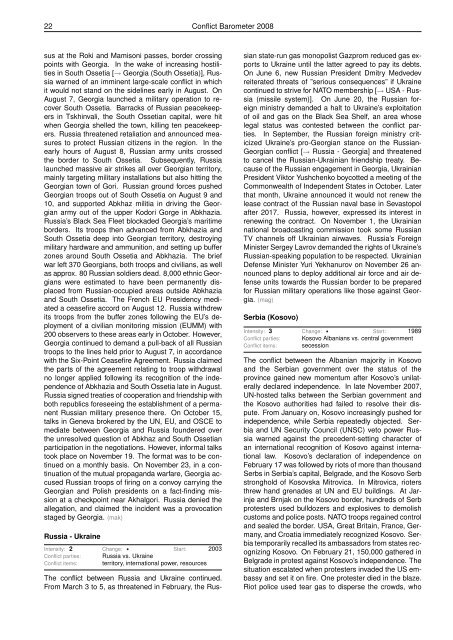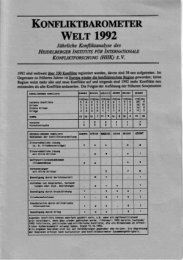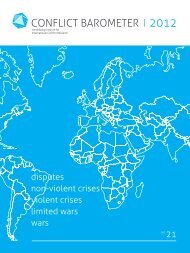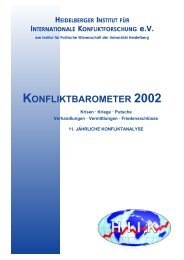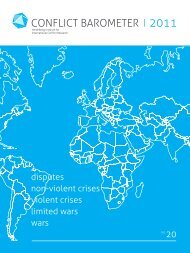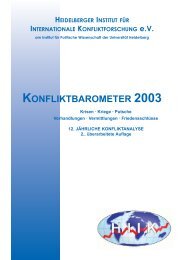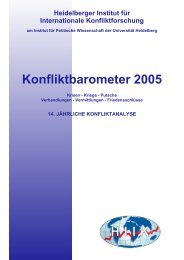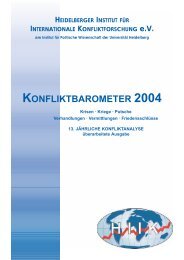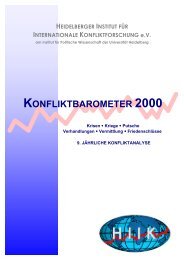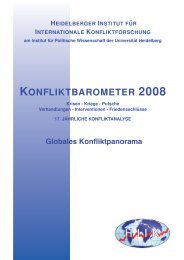CONFLICT BAROMETER 2008
CONFLICT BAROMETER 2008
CONFLICT BAROMETER 2008
Create successful ePaper yourself
Turn your PDF publications into a flip-book with our unique Google optimized e-Paper software.
22 Conflict Barometer <strong>2008</strong><br />
sus at the Roki and Mamisoni passes, border crossing<br />
points with Georgia. In the wake of increasing hostilities<br />
in South Ossetia [→ Georgia (South Ossetia)], Russia<br />
warned of an imminent large-scale conflict in which<br />
it would not stand on the sidelines early in August. On<br />
August 7, Georgia launched a military operation to recover<br />
South Ossetia. Barracks of Russian peacekeepers<br />
in Tskhinvali, the South Ossetian capital, were hit<br />
when Georgia shelled the town, killing ten peacekeepers.<br />
Russia threatened retaliation and announced measures<br />
to protect Russian citizens in the region. In the<br />
early hours of August 8, Russian army units crossed<br />
the border to South Ossetia. Subsequently, Russia<br />
launched massive air strikes all over Georgian territory,<br />
mainly targeting military installations but also hitting the<br />
Georgian town of Gori. Russian ground forces pushed<br />
Georgian troops out of South Ossetia on August 9 and<br />
10, and supported Abkhaz militia in driving the Georgian<br />
army out of the upper Kodori Gorge in Abkhazia.<br />
Russia’s Black Sea Fleet blockaded Georgia’s maritime<br />
borders. Its troops then advanced from Abkhazia and<br />
South Ossetia deep into Georgian territory, destroying<br />
military hardware and ammunition, and setting up buffer<br />
zones around South Ossetia and Abkhazia. The brief<br />
war left 370 Georgians, both troops and civilians, as well<br />
as approx. 80 Russian soldiers dead. 8,000 ethnic Georgians<br />
were estimated to have been permanently displaced<br />
from Russian-occupied areas outside Abkhazia<br />
and South Ossetia. The French EU Presidency mediated<br />
a ceasefire accord on August 12. Russia withdrew<br />
its troops from the buffer zones following the EU’s deployment<br />
of a civilian monitoring mission (EUMM) with<br />
200 observers to these areas early in October. However,<br />
Georgia continued to demand a pull-back of all Russian<br />
troops to the lines held prior to August 7, in accordance<br />
with the Six-Point Ceasefire Agreement. Russia claimed<br />
the parts of the agreement relating to troop withdrawal<br />
no longer applied following its recognition of the independence<br />
of Abkhazia and South Ossetia late in August.<br />
Russia signed treaties of cooperation and friendship with<br />
both republics foreseeing the establishment of a permanent<br />
Russian military presence there. On October 15,<br />
talks in Geneva brokered by the UN, EU, and OSCE to<br />
mediate between Georgia and Russia foundered over<br />
the unresolved question of Abkhaz and South Ossetian<br />
participation in the negotiations. However, informal talks<br />
took place on November 19. The format was to be continued<br />
on a monthly basis. On November 23, in a continuation<br />
of the mutual propaganda warfare, Georgia accused<br />
Russian troops of firing on a convoy carrying the<br />
Georgian and Polish presidents on a fact-finding mission<br />
at a checkpoint near Akhalgori. Russia denied the<br />
allegation, and claimed the incident was a provocation<br />
staged by Georgia. (mak)<br />
Russia - Ukraine<br />
Intensity: 2 Change: Start: 2003<br />
Conflict parties: Russia vs. Ukraine<br />
Conflict items: territory, international power, resources<br />
The conflict between Russia and Ukraine continued.<br />
From March 3 to 5, as threatened in February, the Russian<br />
state-run gas monopolist Gazprom reduced gas exports<br />
to Ukraine until the latter agreed to pay its debts.<br />
On June 6, new Russian President Dmitry Medvedev<br />
reiterated threats of ”serious consequences” if Ukraine<br />
continued to strive for NATO membership [→ USA - Russia<br />
(missile system)]. On June 20, the Russian foreign<br />
ministry demanded a halt to Ukraine’s exploitation<br />
of oil and gas on the Black Sea Shelf, an area whose<br />
legal status was contested between the conflict parties.<br />
In September, the Russian foreign ministry criticized<br />
Ukraine’s pro-Georgian stance on the Russian-<br />
Georgian conflict [→ Russia - Georgia] and threatened<br />
to cancel the Russian-Ukrainian friendship treaty. Because<br />
of the Russian engagement in Georgia, Ukrainian<br />
President Viktor Yushchenko boycotted a meeting of the<br />
Commonwealth of Independent States in October. Later<br />
that month, Ukraine announced it would not renew the<br />
lease contract of the Russian naval base in Sevastopol<br />
after 2017. Russia, however, expressed its interest in<br />
renewing the contract. On November 1, the Ukrainian<br />
national broadcasting commission took some Russian<br />
TV channels off Ukrainian airwaves. Russia’s Foreign<br />
Minister Sergey Lavrov demanded the rights of Ukraine’s<br />
Russian-speaking population to be respected. Ukrainian<br />
Defense Minister Yuri Yekhanurov on November 26 announced<br />
plans to deploy additional air force and air defense<br />
units towards the Russian border to be prepared<br />
for Russian military operations like those against Georgia.<br />
(mag)<br />
Serbia (Kosovo)<br />
Intensity: 3 Change: Start: 1989<br />
Conflict parties: Kosovo Albanians vs. central government<br />
Conflict items: secession<br />
The conflict between the Albanian majority in Kosovo<br />
and the Serbian government over the status of the<br />
province gained new momentum after Kosovo’s unilaterally<br />
declared independence. In late November 2007,<br />
UN-hosted talks between the Serbian government and<br />
the Kosovo authorities had failed to resolve their dispute.<br />
From January on, Kosovo increasingly pushed for<br />
independence, while Serbia repeatedly objected. Serbia<br />
and UN Security Council (UNSC) veto power Russia<br />
warned against the precedent-setting character of<br />
an international recognition of Kosovo against international<br />
law. Kosovo’s declaration of independence on<br />
February 17 was followed by riots of more than thousand<br />
Serbs in Serbia’s capital, Belgrade, and the Kosovo Serb<br />
stronghold of Kosovska Mitrovica. In Mitrovica, rioters<br />
threw hand grenades at UN and EU buildings. At Jarinje<br />
and Brnjak on the Kosovo border, hundreds of Serb<br />
protesters used bulldozers and explosives to demolish<br />
customs and police posts. NATO troops regained control<br />
and sealed the border. USA, Great Britain, France, Germany,<br />
and Croatia immediately recognized Kosovo. Serbia<br />
temporarily recalled its ambassadors from states recognizing<br />
Kosovo. On February 21, 150,000 gathered in<br />
Belgrade in protest against Kosovo’s independence. The<br />
situation escalated when protesters invaded the US embassy<br />
and set it on fire. One protester died in the blaze.<br />
Riot police used tear gas to disperse the crowds, who


